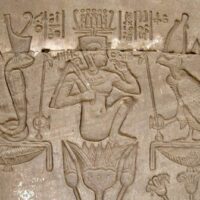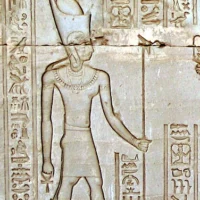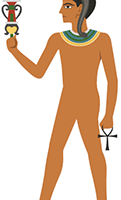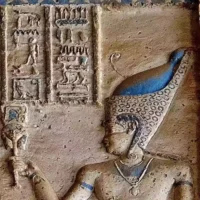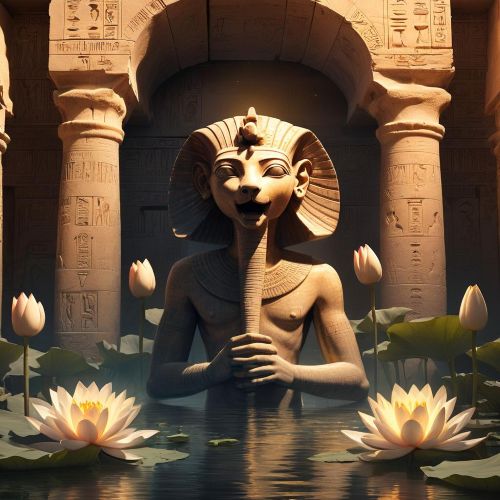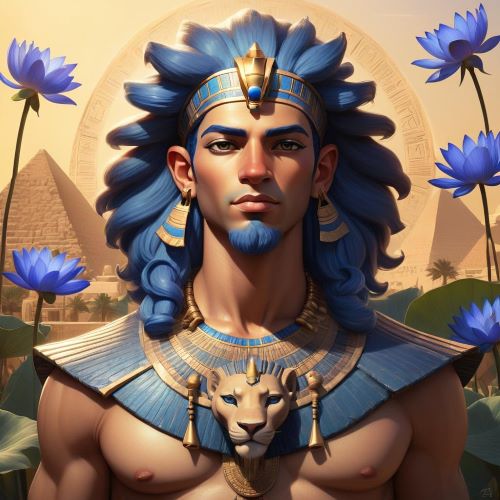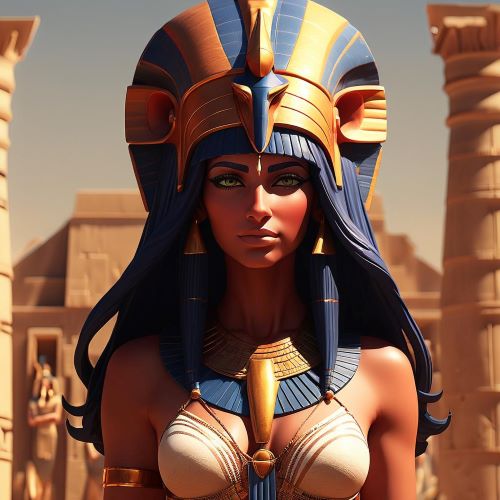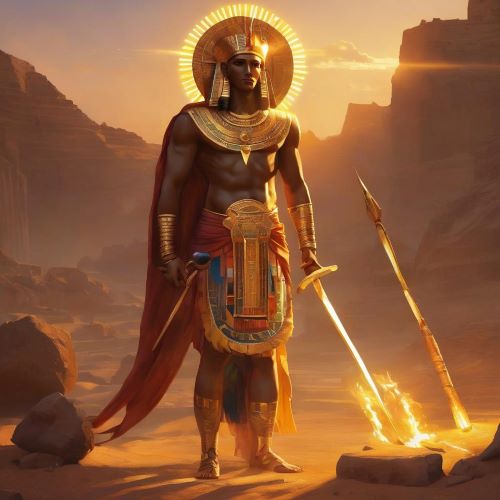Ihy : God of Music
Listen
At a glance
| Description | |
|---|---|
| Origin | Egyptian Mythology |
| Classification | Gods |
| Family Members | Hathor (Mother), Horus (Father) |
| Region | Egypt |
| Associated With | Youth, Music, Joy, Abundance |
Ihy
Introduction
In the vast and intricate mythology of ancient Egypt, Ihy emerges as a figure of pure joy and musical celebration. Often overshadowed by gods of might and creation, Ihy occupies a unique spiritual space—he is the god of music, ecstasy, and ritual merriment. Closely associated with the sacred sistrum, his presence was integral to ceremonies, particularly those involving his mother, Hathor. Far from being a mere divine child, Ihy represents the rhythm of life, the beat of ritual, and the harmony between the human and the divine. His role extended beyond entertainment, embodying deep symbolic power in both temple rites and afterlife beliefs.
Physical Traits
Ihy’s iconography captures his essence as a youthful and vibrant force. Artists portrayed him as a naked child, a common symbol of purity in ancient Egyptian culture. The sidelock of youth, a distinct braid falling over the side of his head, reinforced his status as a divine child. He is often depicted with one finger near or touching his mouth, a traditional gesture representing infancy or innocence.
What sets him apart in sacred imagery is the sistrum he often carries—an emblem not only of joy but also of protection and divine connection. The menat necklace, another symbol linked to his mother, adds layers of fertility and ritual depth. Occasionally adorned with the double crown of Egypt (Pschent), Ihy’s visual representations tie him to both royalty and spiritual authority, especially when featured in temple carvings like those in Dendera, where his image is vibrantly preserved.
Family
Ihy’s parentage reflects the complexity of Egyptian theology. Primarily, he is celebrated as the son of Hathor, the goddess of music, love, and motherhood. Her nurturing and celebratory aspects are deeply embedded in Ihy’s character. His father is often identified as Horus, a major sky god associated with kingship and war, whose protective nature complements Hathor’s nurturing traits.
However, Egyptian mythology allows for multiple theological interpretations. In some regional or temple-specific traditions, Ra—god of the sun—is named as Ihy’s father, blending solar authority with musical ecstasy. Occasionally, other mother figures like Isis or Sekhmet are mentioned, showing the flexible and overlapping roles that deities played in Egyptian belief. Regardless of the specific lineage, Ihy’s divine origins solidify his role as a bridge between joy, divinity, and sacred ritual.
Other names
While Ihy remains the most common name, ancient texts and inscriptions sometimes refer to him using variations such as Ihi, Ahi, or Ahy. These variants all preserve the phonetic essence of his name, which translates to “sistrum-player” or “musician.” Each iteration underscores his primary role: invoking joy and divine harmony through music.
Some poetic texts refer to Ihy as the “Child of Gold,” emphasizing his radiant and sacred nature. In the funerary Book of the Dead, he is described as the “Lord of Bread” and guardian of beer—two staple offerings in Egyptian rituals—tying him directly to abundance and ceremonial nourishment. Another title, “Lord of Vibration,” points to his embodiment of sonic energy, suggesting that his music was believed to have a spiritual frequency capable of elevating consciousness and invoking the divine.
Powers and Abilities
Despite his youthful appearance, Ihy held significant spiritual influence. As the god of music and joy, he governed the sensory experiences that connected people to the divine. The sistrum, an instrument central to his identity, was not merely musical—it was sacred. Its sound was said to drive away evil spirits and please the gods, especially Hathor.
Ihy’s powers also extended to the afterlife. In funerary texts, he is invoked to bring cheer to the souls of the deceased, offering solace and celebration amid the journey to the next world. His name appears in the Pyramid Texts and various ritual manuscripts, always in contexts that call for joy, protection, or divine presence.
He was also considered an overseer of rituals involving food and drink. Bread and beer, symbolic of sustenance and festivity, were under his patronage. Through this, Ihy became a deity of abundance and wellbeing, linking the sacred sound of the sistrum with the nourishment of the body and soul.
Modern Day Influence
While Ihy may not enjoy the global recognition of deities like Anubis or Osiris, his essence continues to ripple through cultural and scholarly realms. His depictions at the Temple of Hathor in Dendera remain some of the most vivid and well-preserved examples of divine childhood and music in ancient art. These relics provide invaluable insight into the spiritual and cultural life of ancient Egypt.
Modern scholars studying ancient musical traditions often refer to Ihy when exploring how sound was used in religious practice. The importance of the sistrum, as both a musical and spiritual tool, highlights a longstanding human connection to rhythm and ritual. In the broader context of Egyptian revivalism and neopagan traditions, Ihy is occasionally honored in rituals celebrating joy, creativity, and childlike wonder.
In popular culture, Ihy has made subtle appearances in literature, video games, and documentaries exploring ancient Egyptian mythology. While he doesn’t hold the spotlight, his archetype—the joyful divine child, bearer of sacred sound—continues to inspire creators and spiritual seekers. His legacy lives on in every celebration where music uplifts the spirit and connects the mortal to the divine.
Related Images
Source
Ancient Egypt: the Mythology – Ihy – egyptian myths. (2014, January 1). Retrieved from http://www.egyptianmyths.net/ihy.htm
Ahy (Ihy) – Origin Story, Powers, Worship, Symbols, & Meaning. (2021, September 16). World History Edu. Retrieved from https://worldhistoryedu.com/ihy-origin-story-powers-worship-symbols-meaning/
Ahy (Ihy) – Ancient Egypt Online. (n.d.). Retrieved from https://ancientegyptonline.co.uk/ahy/
The Enchanting Legacy of the Egyptian God of Music – iEgypt Travels. (n.d.). Retrieved from https://iegypttravels.com/blog/the-egyptian-god-of-music
Ihy: The Ancient Egyptian God Of Music And Joy – Mystery In History. (n.d.). Retrieved from https://mysteryinhistory.com/Ihy/
Ihy – Wikipedia. (n.d.). Retrieved from https://en.wikipedia.org/wiki/Ihy
Ihy | The Ancient Egyptian God Of Music. (n.d.). Retrieved from https://www.ancient-egypt-online.com/ihy.html
Ihy Egyptian God – Ihy The God of Music | Ask Aladdin. (n.d.). Retrieved from https://www.ask-aladdin.com/all-destinations/egypt/category/ancient-egyptian-gods/page/ihy-the-god-of-music
Ihy the Musician and Perfect Child of the Goddess Hathor. (2022, January 13). Retrieved from https://iseumsanctuary.com/2022/01/13/ihy-the-musician-and-perfect-child-of-the-goddess-hathor/
Frequently Asked Questions
What is lorem Ipsum?
I am text block. Click edit button to change this text. Lorem ipsum dolor sit amet, consectetur adipiscing elit. Ut elit tellus, luctus nec ullamcorper mattis, pulvinar dapibus leo.
What is lorem Ipsum?
I am text block. Click edit button to change this text. Lorem ipsum dolor sit amet, consectetur adipiscing elit. Ut elit tellus, luctus nec ullamcorper mattis, pulvinar dapibus leo.
What is lorem Ipsum?
I am text block. Click edit button to change this text. Lorem ipsum dolor sit amet, consectetur adipiscing elit. Ut elit tellus, luctus nec ullamcorper mattis, pulvinar dapibus leo.
What is lorem Ipsum?
I am text block. Click edit button to change this text. Lorem ipsum dolor sit amet, consectetur adipiscing elit. Ut elit tellus, luctus nec ullamcorper mattis, pulvinar dapibus leo.
What is lorem Ipsum?
I am text block. Click edit button to change this text. Lorem ipsum dolor sit amet, consectetur adipiscing elit. Ut elit tellus, luctus nec ullamcorper mattis, pulvinar dapibus leo.



